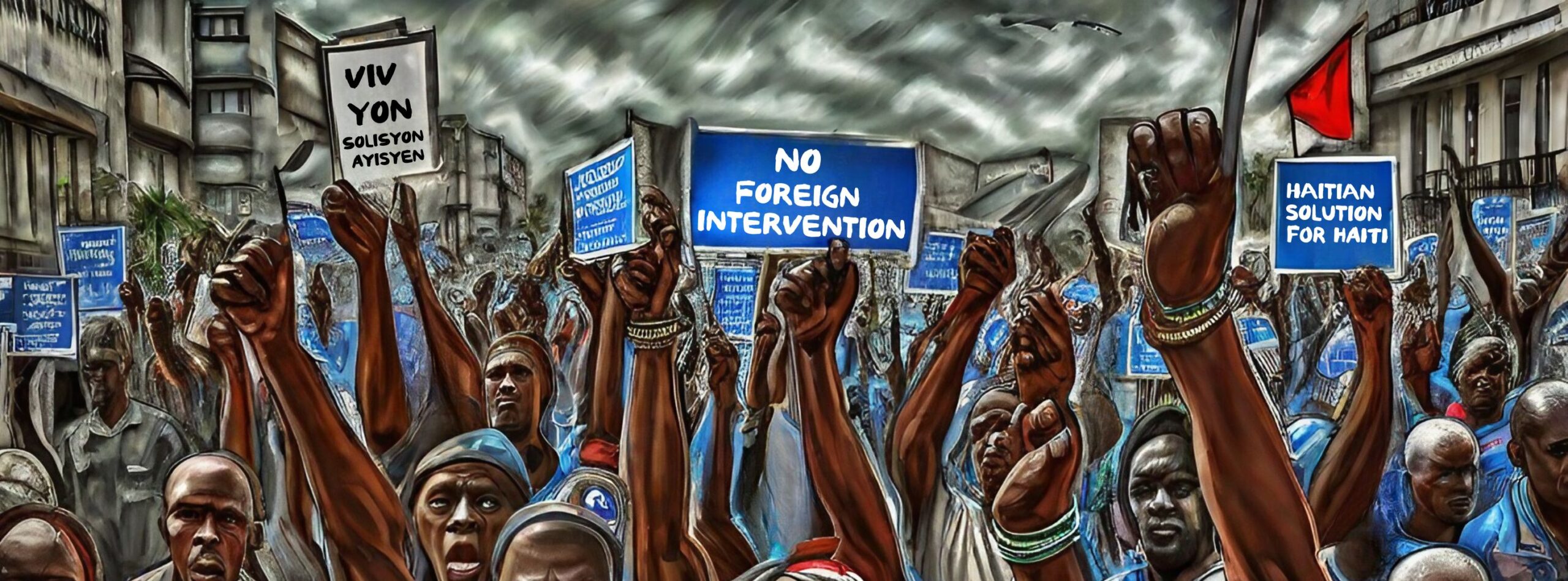CETIM and La Via Campesina Express Concern Over Foreign Intervention in Haiti and Demand Human Rights Protection

La Via Campesina (LVC) and CETIM, representing Haitian peasants’ organizations Tet Kole Ty Peyizan Ayitien, Mouvman Peyizan Papay (MPP) and Mouvman Peyizan Nasyonal Kongre Papay (MPNKP), raised grave concerns about the imminent foreign intervention in Haiti and the severe and widespread human rights violations faced by Haitians, particularly in rural areas.
On the 2nd of October 2023, the UN Security Council, approved the deployment of an international security force to supposedly fight gang violence and restore security. Social movements and peasants’ organizations have been warning that this is a pretext to keep the country subjugated to neocolonial interests.
Haiti’s history, beginning with its 1804 independence, has been marked by external interference, undermining its sovereignty. Foreign military interventions, such as the US occupation from 1915 to 1934, have perpetuated a multidimensional crisis which generated inequalities and misery.
Today, Haiti grapples with political instability and criminal gangs, exacerbated by the assassination of President Jovenel Moïse in 2021. Gangs control parts of the capital, leading to violence, fear, and displacement. Malnutrition, disease, business closures, and unemployment further worsen the crisis.
Alarming data from the UN Integrated Office in Haiti (UNIHRO) reveal a surge in homicides and kidnappings in 2023. Reports by Haitian organizations, including Fondasyon Je Klere (FJKL) and the Réseau National de Défense des Droits Humains (RNDDH), document increased violence. Moreover, 130,000 internally displaced people in Port-au-Prince highlight the extent of the crisis.
Peasant communities suffer due to government neglect, food insecurity, land grabbing, and violence. Industrial zones displace peasants, and the corrupt judicial system further exacerbates these injustices. Peasant communities are also burdened by inflation, resulting in acute food insecurity for a significant portion of the population.
Despite multiple UN interventions, Haiti’s challenges persist, with unfulfilled promises and the influential « Haiti Core Group » shaping the nation’s politics, a group created in 2004 after US, French and Canadian troops overthrew the Haitian government. Haitians must regain their sovereignty and rely on authentic international solidarity to safeguard their rights.
The aforementioned organizations are committed to Haitian human rights and oppose any military intervention and occupation. They endorse the demands arising from the field, urging the Human Rights Council and UN Member States involved in Haiti to:
- put an immediate end to all interferences in the country’s internal affairs. The Core Group must cease all interference and allow legitimate democratic institutions, social movements and political organisations to take the necessary steps to put the country back on the road to peace and democracy;
- put an immediate end to the plans of invasion of the country by foreign forces and thus respect the sovereignty, independence and territorial integrity of Haiti;
- respect their international human rights commitments and protect the human rights of the Haitian people, in particular the economic, social and cultural rights of the most vulnerable sections of the population, as well as the right to self-determination of the Haitian people;
- contribute to the process of democratic transition, starting with the establishment of a transition government with a clear and precise plan that addresses the needs identified by the Montana Agreement, in order to create optimal conditions for the organisation of free and democratic elections;
- contribute to the re-launch of agricultural production, while protecting the rights of peasants and rural populations, in the light of the provisions of the UN Declaration on the Rights of Peasants and Other People Working in Rural Areas.
We call for international solidarity with Haiti, in order to support a Haitian solution for Haiti and contribute to the recovery of this nation.
As part of the 54th session of the UN Human Rights Council (11 September-13 October 2023), the above-mentioned organisations submitted a written statement expressing their deep concern about the impending foreign intervention in Haiti and the serious and widespread human rights violations suffered by Haitians, particularly in rural areas. However, this statement was not published by the UN for “technical reasons”.
See the video-statement by Micherline Islanda Aduel to the Human Rights Council
Read the full report on the situation in Haïti submitted to the Human Rights Council by LVC, CETIM, Tet Kole Ty Peyizan Ayitien, Mouvman Peyizan Papay (MPP) and Mouvman Peyizan Nasyonal Kongre Papay (MPNKP)
